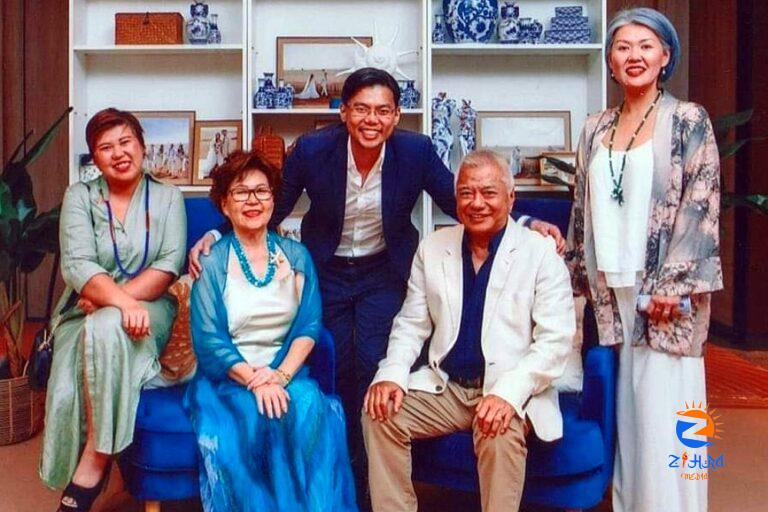
[ad_1]

The columnist (seated, right) and his wife Doreen Then with their children (from left) Debra, Dylan and Dyan, seen in this photo taken at Kuching Hilton recently.

TOMORROW, June 18, is celebrated as Fathers’ Day throughout most of the world.
It is usually a much lower-profile and lower-key affair in the family after Christmas, Chinese New Year, Hari Raya, Gawai, Wesak, Deepavali, or Mother’s Day.
I would reckon that it even comes only after birthdays of parents, or siblings, or children.
In my personal opinion, it is society’s attitude that fathers are supposed to be the primary (even sole) breadwinner of the family; he’s also the patriarchal figure, the ‘Numero Uno’ and the ‘Boss’ as it were, and as such, he is duty-bound and expected to fully support, contribute and care for the welfare of all in the family. In many communities, fathers are shown to be stern, strict and staid disciplinarians whose every word is law.
Mothers are and deservedly thought to be more loving, caring, of a warm and ‘motherly’ nature, and a good listener, expert advisor and strong guardian of the family’s welfare and well-being, besides grooming, teaching and bringing up all the children, and ensuring their continued good health since birth.
I would even go a bit further to say that in times of trouble or doubt or whenever matters of the heart is sought, it’s mostly the mother who would be consulted, unless they are matters pertaining to finance or work.
Issues of human relationships? Go speak with Mom!
Only when it comes to probably helping one out on paying for a car or a house, or some career move or a work issue would you go see Dad as a destination of last resort.
Times too have changed. Within my living memory I could from personal experience glean that as a parent, there are vast differences in the ways and manners that my grandfather had during his time (1890s-1980s) and my father (1926-2022), brought up their children – as well as their relationship with them.
Then again, in my own era, from 1975 till now and still ongoing, how I, as a parent, behave and bring up my own children.
Some of the changes have been radical and some would even say extreme, but most of the interactions as family members of juniors towards seniors are still intact and as strong as ever.
Still, many previously-held standards and decisions are no longer held or being practised by either or both sides.
Let me try and highlight a few of the differences.
My grandfather was Ong Kwan Hin. He was born on June 4, 1896 and died in 1982, at age 86.

Grandpa Ong Kwan Hin (right), at age 77, attending the columnist’s wedding on Dec 11, 1973.
He was the second son of Ong Tiang Swee, who was known as the ‘Grand Old Man’ and was a Kapitan China during the rule of the White Rajah, and was awarded the OBE and ‘Star of Sarawak’ (CSS) during this lifetime.
Grandpa had 14 children, 10 sons and four daughters. Of the 10 sons, two had died at a young age; three had gone into business (banking, agriculture and fisheries) and five into the civil service. In their own fields of endeavours, one could say they were all very successful and some had even made their fame and fortune.
Grandpa was a towering figure and himself quite a fiery personality with an impeccable sense of dressing. He would always be smartly attired in the Western style when he went to work; even after he had semi-retired, he would go down to his office at Main Bazaar keeping to his regular hours.
Grandpa was a stickler for formality and most times would require an appointment to be made for his children to see him – those living on their own – and they would also know when not to come, during his afternoon naps after his retirement and after certain hours at night.
His wife, together with his youngest daughter Rosalind, would be there to tend to his diary of events.
Not much information has been revealed in the biography of my eldest uncle Ong Kee Hui about his relationship with Grandpa (his father) although there were certainly some strict family rules to follow once his siblings were of school-going age, and later when they had to choose their careers.
All my uncles had attended St Thomas’ Primary School to start and secondary to follow, and later for further studies, it was at St Andrews in Singapore for the three eldest boys.
The girls were not sent overseas. The four girls had all gone to St Mary’s School, which was considered the ‘sister school’ of St Thomas’ and both were at the top of the ‘Premier League’ of the schools, having being founded 175 years ago in 1848 by Bishop Francis MacDougall upon the order of Rajah James Brooke.
It was very forward-thinking of Grandpa then to firstly give Anglicised names to all his children (so that they could be more easily identified in school) and to also allow them all to study in a Christian Mission school, having being himself the guardian/custodian of several Buddhist temples in Kuching and a staunch practising Buddhist.
Two other rules had also been strictly adhered to – it was the custom and tradition to arrange marriages between my uncles and aunties with those eligible from other similar ‘ranking Chinese families’ – where possible, even to the point that the betrothal must be from the same dialect group and of about the same age and equal educational qualifications.
However, I am pleased to advise that there were no ‘Romeo and Juliet’ stories from this rule as although some ‘arranged marriages’ did not eventually materialise, most were either persuaded to merge or had actually even fallen in love with each other after the feelers were put out by ‘matchmakers’.
In my personal case, Dad did in fact fall in love with Mom when they were both in the Boys Scouts and Girl Guides movements. Luckily for both, their parents were totally accepting of the match.
Fairy tales do come true.
A final radical decision, which during Grandpa’s days was the norm but no longer true even from the time of Dad to myself, was that Grandpa had the last say and the deciding vote on what profession, job or career that any of his son or daughter could pursue.
First of all, the priority was to work in the family business, and it would appear that none of the children had any interest in any of Grandpa’s business interests – not in life insurance (he was the oldest Great Eastern Life agency), the poultry farm, some import-export and others.
Uncle Kee Hui had first joined the Department of Agriculture, but left after a short stint to become a banker and later took on public life as first a Council Negri member, councillor, then Mayor and eventually, a federal minister.
Then came Kee Chong, who also joined the same department and had retired after a long successful career as the Director of Agriculture. Uncles No 3 and No 4 passed away at an early age.
Uncle No 5 Henry had gone into business firstly into fisheries, and had also joined politics.
My Dad, who was sixth in line, also joined the Inland Fisheries in the Agriculture Department and retired as its director.

Columnist’s father, Ong Kee Bian (1926-2022).
Uncle No 7 Kee Huat had worked for the Resident’s Office as a senior administrative manager; Uncle Kee Chin had worked in the field of agriculture too; Uncle Kee Pheng became the headmaster of St Thomas’ Primary School; and Uncle Jimmy Kee Chiang an engineer at Radio Sarawak until it became Radio Televisyen Malaysia (RTM) Sarawak.
Of the four sisters, the elder two married into well-established families; Auntie Mary had set up the social welfare services in the government and also became the Commissioner of the Girl Guides; Auntie Rosalind became the PA of the director of Royal Customs and Excise Department.
From Dad’s days, we have lost all those rules and restrictions, and have become freer with the ability to make our own decisions on almost anything that affects our own personal lives.
As for myself, as a father to my three children, I too have given them all the freedom that they could ever wish for – although during the late 1970s and early 1980s when growing up, there were certain house rules that they had to follow or abide by.
Certainly the days of arranged marriages, pre-planned careers and handpicked institutions of higher learning – all those are long gone, but we still as parents do feel the need and indeed expect our children to come running home to us for comfort, in times of difficulty and God-forbid, strained or broken relationships and other human mishaps.
After all as a parent, be it as a father or as a mother, this is what we are here for.
This week may I wish all fathers reading this – be blessed and continue to do what you do best; be strong, guide and love your family and most of all, love God.
Have a blessed Father’s Day to all the fathers here.
[ad_2]